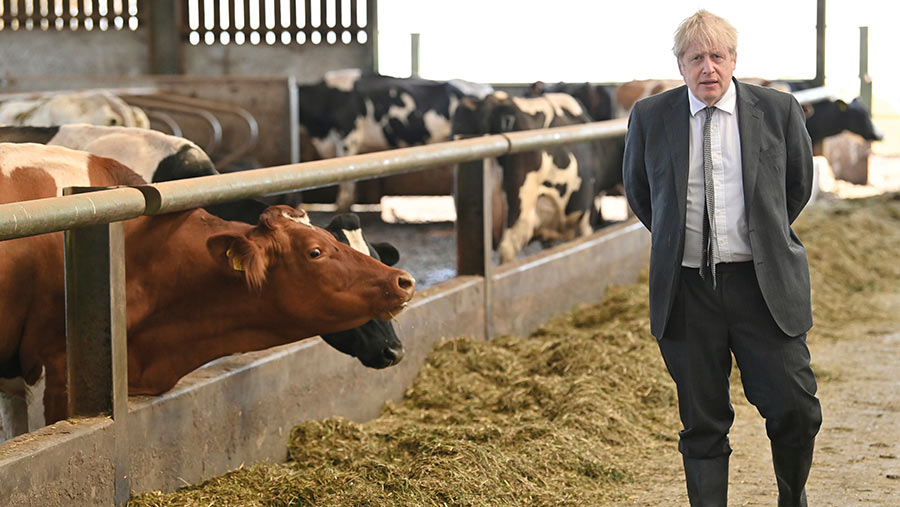Opinion: Boris must support farms to achieve a green economy
 Boris Johnson © Paul Ellis/AP/Shutterstock
Boris Johnson © Paul Ellis/AP/Shutterstock “I hate to break it you, but our food processing industry does involve the killing of a lot of animals. That is the reality. You need to understand that is what happens.”
Those facetious comments from prime minister Boris Johnson on the BBC’s The Andrew Marr Show amounted to mocking at its most unbecoming.
It felt like a head boy trying to embarrass a junior pupil after being outwitted in a school quiz.
See also: Pig producers vent anger at Tory conference as crisis deepens
Andrew Marr was questioning the PM’s welfare position on pigs being killed on farms due to a lack of staff in abattoirs.
Boris Johnston was ruffled. He then launched an intellectual grenade to try to wriggle out of the corner he found himself in.
“If I may say so, the great hecatomb of pigs you describe on farms has not taken place.” I don’t suppose I was alone in not knowing what the hell a “hecatomb” is. A large sacrifice of cattle, apparently…
Those who use examples from ancient Greece to substantiate an argument probably don’t do the weekly shop in Tesco, or know the provenance and price of pork chops on half-empty shelves in Morrisons.
But treating the pig sector, specifically, and animal welfare, more broadly, with such disdain insults the whole farming industry at a time when the government needs farmers to support its new Environmental Land Management (ELM) scheme, to meet its green promises.
An unreasonable expectation of cheap food exploits global farmers and the land we farm
Back at the Tory party conference in Manchester, Boris described the current mess as “stresses and strains” after the pandemic, carefully avoiding any mention of Brexit.
Mass immigration is apparently to be replaced with higher wages and better conditions to encourage people into key sectors.
With less “Homer” and more “Maynard Keynes”, he may find his promise of a high-skill, high-wage economy, while pledging to keep a lid on inflation and taxation, a challenging proposition.
Politicians and journalists love scapegoats.
The Tories want farmers, hauliers and meat processors to pay staff more, to oil the wheels. The hacks want politicians to legislate for better working conditions. If only it were that simple.
Writing in The Times, Libby Purves refers to our nation’s two addictions – the “just-in-time” culture and an expectation for things to be unreasonably cheap.
This, she says, goes hand in hand with “contemptuous exploitation”, including of the workforce.
The work of a picker or abattoir worker is hard. I wouldn’t want to do it day in, day out. But to say that the working conditions and pay “exploit” is misleading.
Bluntly, the transition of society means there are fewer and fewer people willing to commit to such a physical working day.
Most would choose a job that is less physical or antisocial, even if it means slightly less money.
But, unwittingly, Ms Purves arrives at the root of the issue. Her “contemptuous exploitation” summarises attitudes towards food.
An unreasonable expectation of cheap food exploits global farmers and the land we farm.
Meagre margins for crops, fresh produce and livestock place far too great a burden on the farmer, the workers, the land and biodiversity. This is the brittle foundation on which our food supply chain is built.
Boris’ pledge to move the entire UK towards high-wage, high-skill employment and huge environmental commitments for the UK’s COP26 presidency next month may require a “hecatomb” of his current attitude and policies towards UK agriculture.

